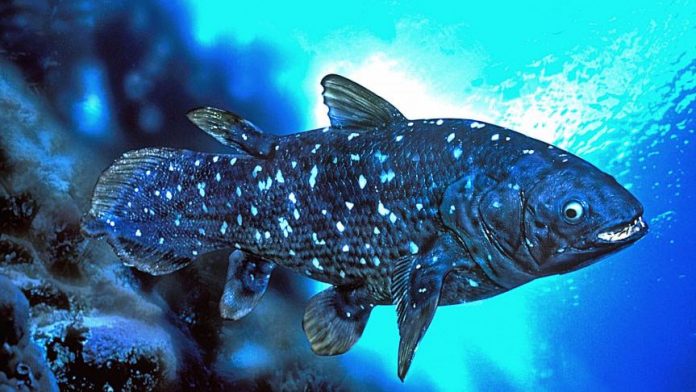French researchers have found that an unusual fish, the coelacanth, can live up to a century, doesn’t fully mature until it reaches age 45, and spends years in the womb. Coelacanths are nicknamed, “living fossils.”
Previously, it was estimated that the coelacanth was a fast-growing fish that lived for about 20 years. But, the new research published in Current Biology estimates that the fishes’ life span is around 100 years. This conclusion was made by studying the coelacanth’s scales under polarized light.
“The maximum longevity of coelacanth was five times longer than previously thought, hence around a century,” Kélig Mahé, the paper’s lead author, said in a press release.
When calculating the age of coelacanth fish in the past, researchers counted the large lines on a specific scale of the fish. However, the French researchers found that they were missing many smaller lines — lines that could only be seen using polarized light, according to The Guardian.
A marine evolutionary biologist at France’s marine research institute said they found around five smaller lines for every big one. The oldest specimen they studied was 84 years old.
Coelacanths are slow-moving and can grow to be human-sized, though it takes many years to reach their full size.
A female coelacanth isn’t sexually mature until their late 50s, while the researchers found that male coelacanth’s become sexually mature between 40 and 69 years old. Interestingly, researchers think the gestation period for a coelacanth pregnancy is around 5 years.
Harold Walker of Scripps Institution of Oceanography in San Diego said this long gestation period is “very strange” for any animal, according to The Guardian.
The fish are estimated to have been around for 400 million years, and they were thought to be extinct until 1938 when they were found alive in the waters near South Africa.
Although not extinct anymore, the species is endangered, so researchers are only permitted to study fish that are already dead, according to The Guardian.
“Those that live slowly, producing few young over long lives — like elephants or great whales — are at great risk from us,” Callum Roberts, a marine conservation biologist at the University of Exeter said in an email to Gizmodo. “According to this new study, the coelacanth hangs on at the brink of existence, and is at an exceptionally high risk of disappearing forever.”
Audrey Nakagawa is the content creator intern at EcoWatch. She is a senior at James Madison University studying Media, Art, and Design, with a concentration in journalism. She’s a reporter for The Breeze in the culture section and writes features on Harrisonburg artists, album reviews, and topics related to mental health and the environment. She was also a contributor for Virginia Reports where she reported on the impact that COVID-19 had on college students.





























